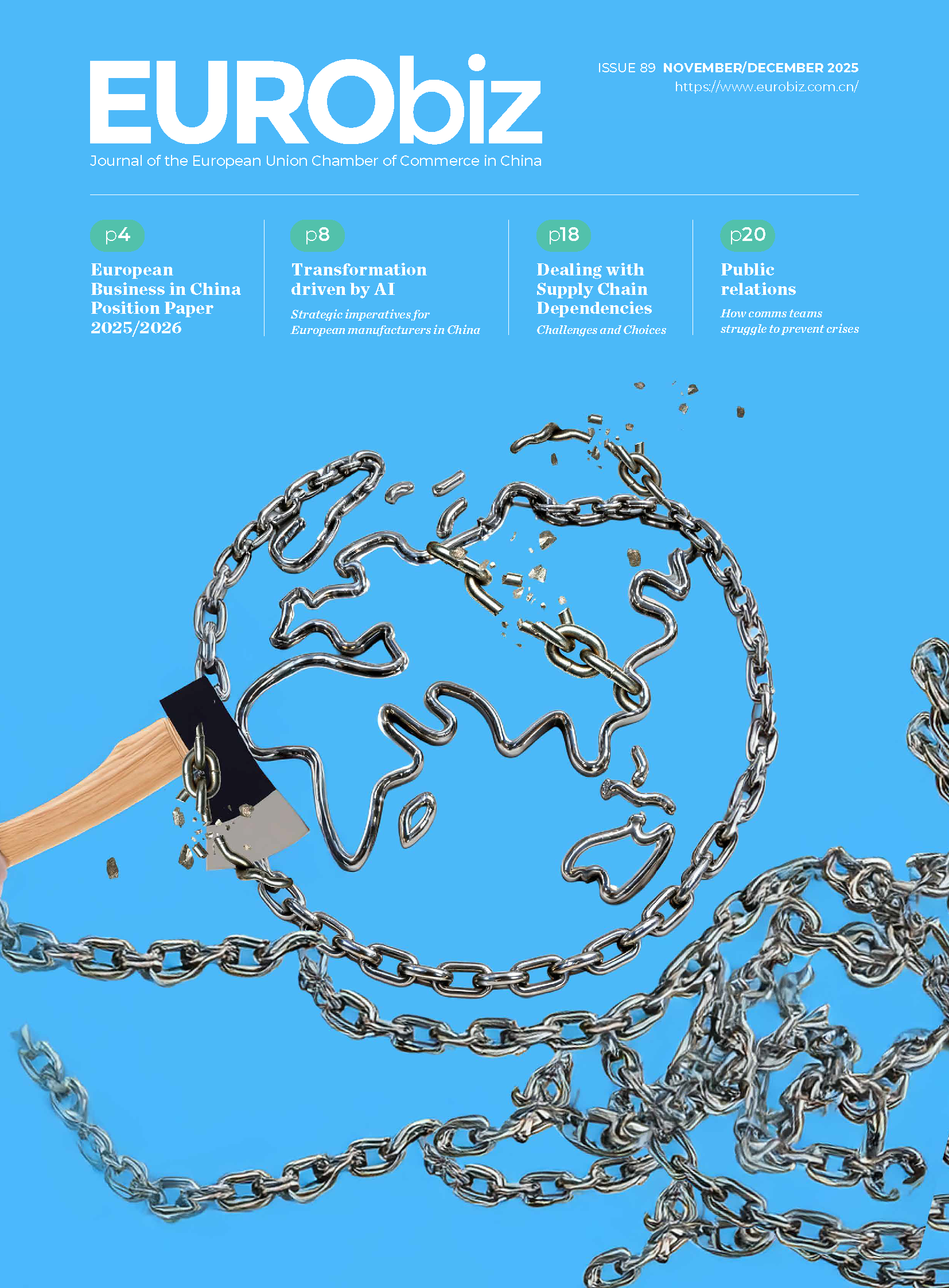
Increased difficulty doing business and subdued expectations: the new normal?
After China ended its zero-COVID policy in late 2022, Chinese officials began issuing a series of policy plans geared towards restoring business confidence and strengthening the foundations of the Chinese economy. However, as the Business Confidence Survey 2025 indicates, this has not yet resulted in an uptick in business confidence; rather, the picture has deteriorated across many key metrics.
A record percentage of respondents (73%, +5 percentage points (pp) year-on-year (y-o-y)) reported that doing business in China became more difficult in 2024, while bottom lines continued to underwhelm. Optimism about near-term future growth and profitability in China reached record low levels, clocking in at 29% and 12% respectively; and the importance of China for European businesses’ global profits diminished, with seven in 10 respondents reporting earnings before interest and taxes margins in China less than or equal to their worldwide average.
European sentiment may not have bottomed out yet
Market access and regulatory barriers remain widespread, with a record high (63%, +5pp y-o-y) having missed business opportunities in 2024. Progress was made on some issues, including the ease with which companies are able to transfer data cross-border. However, over the next five years: 44% expect the number of regulatory obstacles faced to increase (-3pp y-o-y). In addition, 44% do not expect a level playing field between foreign and domestic enterprises in their industry (+1pp y-o-y); and a third do not expect to see meaningful market opening (33%, +2pp y-o-y).
The picture is further complicated by the fact that politics continues to impact business. A majority (52%) reported that the business environment in China became more politicised in 2024. A significant number of European Chamber members came under increased pressure from Chinese, European and third-country governments, as well as customers. With United States (US)-China and European Union (EU)-China trade tensions escalating, and different legal regimes increasingly coming into conflict, sentiment is widespread that business will become more politicised throughout the coming year.
Despite China’s leadership in green technology and the country’s massive growth in installed green electricity generation capacity, European companies also continue to face issues when it comes to decarbonising their China operations, a central consideration when evaluating if and where to make fresh investments. Confronted by challenges to achieving carbon neutrality, some Chamber members have diluted or even postponed related targets: the proportion of respondents reporting that they are not trying to achieve carbon neutrality in China increased 5pp y-o-y.
Investment and operational strategies are being adjusted accordingly
Because of these developments, fewer are planning to grow their footprint in China. A record low percentage of respondents plan to expand operations in the country over the coming year (38%, -4pp y-o-y); and the proportion of those cutting costs—which for many entails headcount reduction—is equal to last year’s historic high of 52%.
China’s standing as an investment destination remains below potential with nearly one in five reporting that the country is not even a top-10 destination for current investments (19%, no pp change y-o-y). On top of this, the overall value of reinvestment is falling, with 37% (+2pp y-o-y) planning on doing so at a level lower than their historical average.
Meanwhile, European companies are continuing to silo their China operations in response to the more uncertain global environment while also pivoting to other markets that are more alluring. There has been an increase in the proportion of Chamber members that have already moved both current (17%, +4pp y-o-y) and future investments (16%, +4pp y-o-y) from the country, with Europe overtaking the Association of Southeast Asian Nations as the main beneficiary of these investment shifts.
Many companies are continuing to adjust their supply chain strategies as well. There has been an increase in the proportion of those onshoring into the Chinese mainland (26%, +5pp y-o-y); and half this figure (13%) are offshoring, or in the process of establishing alternative supply chains outside of the country, for commercial reasons, as well as to build resilience and hedge against potential future shocks.
These trends may come at a cost, both to business and to China
A majority of Chamber members report reviewing their supply chain strategies to strengthen supply chain resilience and/or for cost-related reasons. Some companies have taken the decision to separate certain China-based functions, or even entire operations, from the rest of the world for non-commercial reasons, such as to comply with regulatory or localisation requirements. This increases overall costs and global compliance risks, while resulting in inefficiencies, reduced innovation capacity and a loss of international competitiveness. This ‘decoupling’ that is taking place between company headquarters and China entities is leading to a slowdown in overall operations and difficulties capitalising on new investment plans, precipitating a negative cycle of disengagement.
For China, these developments are opening the door wider for other markets to court foreign investment at its expense.
Nevertheless, the Chinese authorities have many ways to address this. Full implementation of recent measures aimed at optimising the business environment would help prevent a further deterioration of foreign investor confidence and provide a strong foundation to build upon. The majority of Chamber members are ready to commit more if China implements reforms to further open its market: 53% would increase their investments if granted greater access. Other factors that would incentivise European companies to increase their investment are the creation of a more transparent regulatory environment, making business less politicised and providing equal access to procurement opportunities.
It is therefore positive that tackling the main challenges facing China’s economy has now been placed front and centre of the country’s policy discourse, including at the 2025 Two Sessions. It is also encouraging that recent policy announcements aimed at improving the environment for foreign investment have emphasised the need to follow through on implementation.
The European Chamber believes that its members can play a key supporting role in this process. Deeper cooperation between the Chinese authorities and the European business community can result in effective, actionable plans to reverse the deterioration of China’s business environment before it becomes the new normal.
The European Chamber’s Business Confidence Survey 2025 is available to download free from the Chamber’s website. Please visit: https://www.europeanchamber.com.cn/en/publications-business-confidence-survey
Robbie Jarvis is a senior policy and communications manager at the European Chamber and was the lead author of this year’s Business Confidence Survey.


Recent Comments